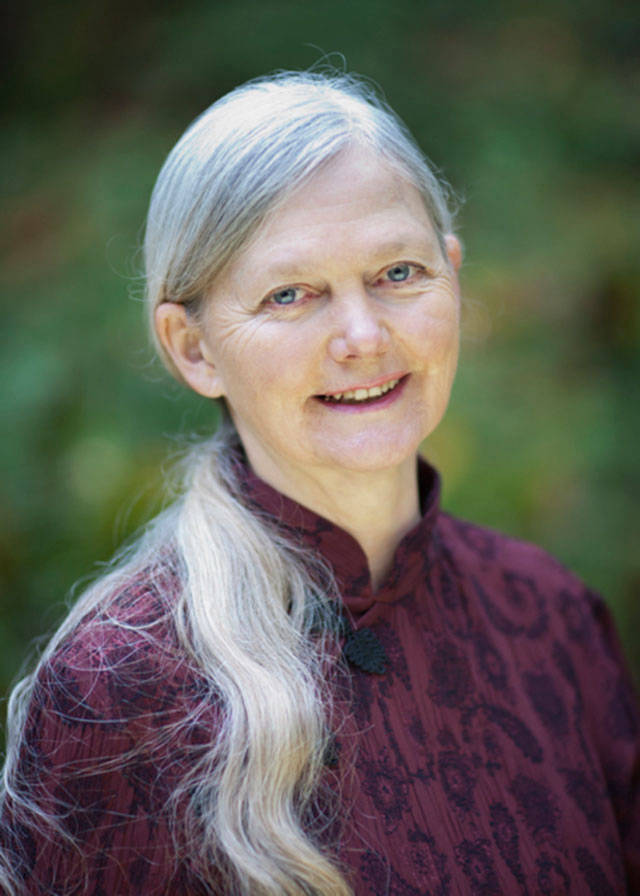By Diane Emerson
Do you cringe when you see recycling bins overflowing with trash? Me too.
When you are finished with your food or drink, how do you know if the container is recyclable? That was one of the screening questions I asked of the people who wanted to work at the Strawberry Festival’s recycling stations this year. Nearly everyone answered: “The number in the triangle on the bottom of the container.” Nope.
That may have been true at one time, back when recycling was just getting going. These days, even though those triangles are still on the package, the guidance for us consumers is to recycle by shape and use the pictures in the recycling guides put out by whoever takes in our recycling. Pierce County’s guide actually says: “Ignore numbers/symbols on packaging.”
Here’s another question for you: Where can you recycle plastic cups? A. The King County Transfer Station, or B. Your Vashon curbside pickup company, Waste Connections (aka DM Recycling). If you answered “A,” you would be correct. Our Vashon curbside/business pickup company accepts no cups of any kind.
These are just two of the reasons why we decided to handle the Strawberry Festival recycling in a new way. This year, we didn’t expect festival-goers to know the intricate and ever-changing details of Vashon’s two recycling systems. We had trained, paid staff running two recycling stations that took in anything people wanted to get rid of: recycling, food waste, and trash. Just like at a café. We emptied and rinsed cans and bottles, removed caps and separated recycling from the trash and compostables. We also went out on the street and dug through trash bins to pull out recycling, compostables and food waste.
The result? Around 940 gallons of various materials were rescued from the landfill. The recycling was uncontaminated, as was the food collected for island pigs and worms, and the paper and cardboard stayed dry. Thanks to our many generous sponsors, 14 people were paid to do this work, and six more volunteered to help out.
So what’s next? Next will be a Green Event Kit, containing all the items needed for event organizers to end up with clean, correct recycling. Zero Waste Vashon and others are working this. To keep costs down, trained volunteers could do the work, or student clubs could use it as a paid fundraiser. This could be a great alternative to the car washes, which unfortunately send soapy water directly down Shinglemill Creek.
I would like to see event organizers use this Green Event Kit and pay as much attention to their trash stream as they do to promoting their events — budget accordingly, and include it early in the planning process. Not just big events, but small ones too. Family reunions, conferences, weddings — any event where food or drinks are offered.
What’s next for the Strawberry Festival? I would like to see the end of plastic water bottles and boxed water at the festival. I estimate 90% of all the recycling we took in at the Strawberry Festival was plastic water bottles or boxed water cartons. We should invest instead in water stations and sell at cost, not give, refillable water bottles to the public. Then we should include in our festival promotion that people should bring their water bottles, and we will refill them. There is no greener packaging than no packaging.
And then there is the issue of compostable plastics. Did you know that compostable plastic cups, bowls, plates and utensils are all to be put in the trash on Vashon? These compostable plastics are engineered to break down only in a commercial recycling facility, and we don’t have one of those on Vashon — not yet, anyway. Neither the transfer station nor the curbside pickup accepts compostable plastic as compostable. They only accept food waste. Event organizers should use paper plates, bowls and cups because these are more easily composted in our lower temperature compost bins. Better yet, use items that are washed and reused, rather than any paper or plastic products.
Kudos to Marie Browne and her team, who once again supplied metal utensils from Granny’s Attic for the festival food vendors. They were collected, sterilized and put back on Granny’s shelves. We need to invest in more zero waste solutions like that for Strawberry Festival and other large events.
Handling our waste stream in this way costs more than just throwing everything “away.” But as we all know, there is no “away” on a finite planet. We need to work on creating a circular economy, and minimizing the waste we generate at events is an important part of it.
— Diane Emerson works in many areas of sustainability.



